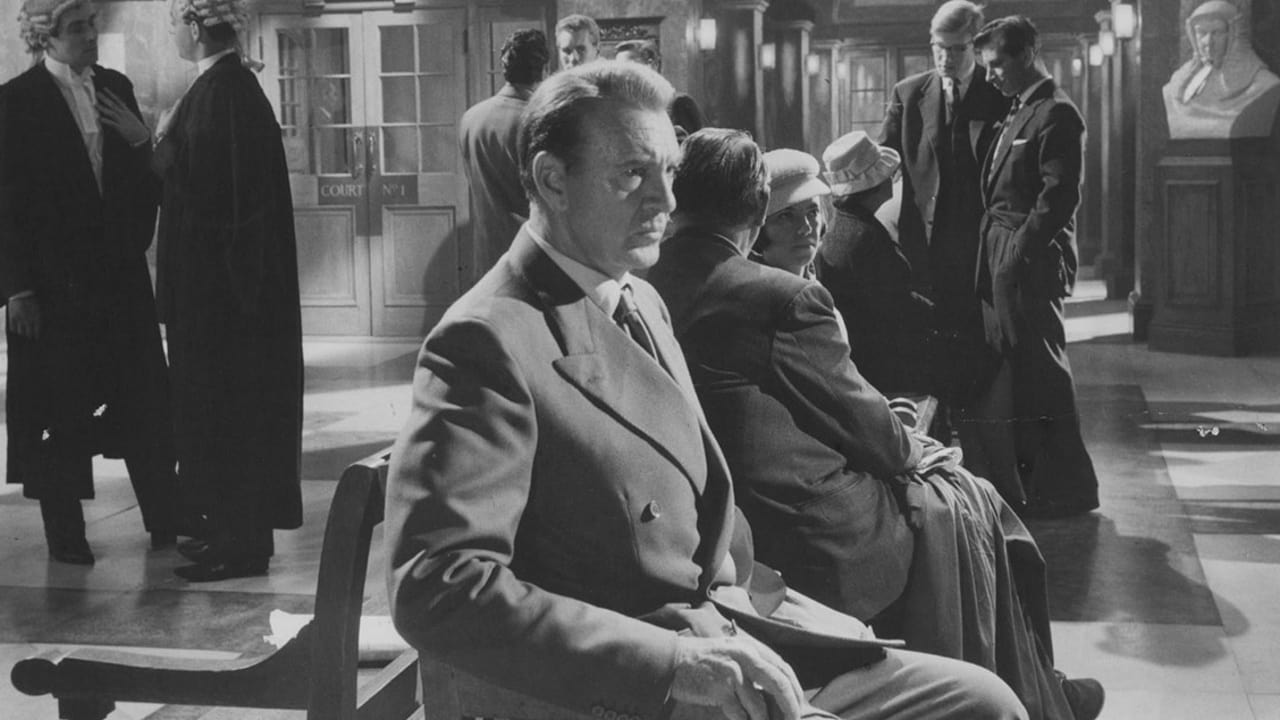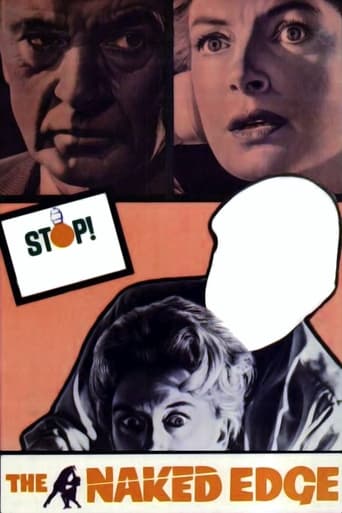



Sadly Over-hyped
Charming and brutal
It's an amazing and heartbreaking story.
The plot isn't so bad, but the pace of storytelling is too slow which makes people bored. Certain moments are so obvious and unnecessary for the main plot. I would've fast-forwarded those moments if it was an online streaming. The ending looks like implying a sequel, not sure if this movie will get one
View MoreThis movie might have been called The Cutting Edge for all the boundaries of 1961 it pushed! It utilizes innovative camera and editing techniques that echo Alfred Hitchcock's scary scenes from Psycho, alludes to sex in a way few films had been able to do since the fall of the Hays Code, and put the word "naked" in the title! Even the first shot of the film is unusual, making you wonder, "Why did they show that? What am I missing?" for the first of many times as the mystery continues throughout the film. A bead of sweat is shown running down Gary Cooper's face. He's in court, ready to testify as a key witness to a murder. His accounting condemns a man to life imprisonment, and the guilt rattles him after the trial. Years later, he's a successful businessman, and he and his wife Deborah Kerr are living a life of luxury. He receives a threatening letter, making Deborah doubt his testimony all those years ago. . .The Naked Edge is one scary movie! I'm not his biggest fan, but Gary Cooper gives a more energetic performance than he usually does. Although Deborah's character isn't written to be the smartest tool in the shed, she does a good job exuding her fear and doubt without turning it into a melodrama. Usually, Gary plays likable, earnest roles. This is the only movie I've seen where Gary Cooper plays a bad guy! This one's pretty scary and very suspenseful, so rent it on Halloween and cuddle up to your honey—or don't. . .DLM Warning: If you suffer from vertigo or dizzy spells, like my mom does, there's one part of the movie that might that will make you sick. There's a scene where Deborah Kerr gets lost and when she runs up and down the streets, the camera is hand-held. In other words, "Don't Look, Mom!"
View MoreA sales manager (Gary Cooper) fingers coworker (Ray McAnally) for the murder of his boss and theft of a large sum of money. After the trial, Cooper tells wife Deborah Kerr that he is purchasing a business with a large sum of money he made from a killing in the market. With the prodding of blackmailer Eric Portman, Kerr grows increasingly suspicious that her husband was guilty of the murder and theft. Cooper was horribly miscast: He was too old for this role - he looked ridiculous next to Kerr discussing how they were struggling to make it. Coop at the time was around 60 years old and looked much older; by contrast Kerr was about 40 and looked younger (and was lovely to boot). Thus he's never believable in the role. The direction of this movie left much to be desired. The scenes become tedious replaying themselves over several times. Music blares at points when high suspense is supposed to build. The courtroom scenes were stagy and failed to build any drama. The ending was less than satisfactory feeling rushed and not tying in the loose ends. Nevertheless, the cast is good and turned in fine performances with the exception of Cooper, who struggled with the dialog, and Michael Wilding who is mostly wasted. And the plot is interesting enough but the script and execution are lacking. Some of the cinematography of London is very good and in general the film has an appropriate dark noirish atmosphere. However, there's a good reason why this is a forgotten thriller.
View MoreI recently watched this film on video and found myself fast-forwarding through it. It moved very slowly and was difficult to follow and there was way too much talking. All I knew was that Gary Cooper's (his last film) character was witness to a murder while working late in his office one night and that his wife (Deborah Kerr in a really bad performance) suspected that he did it. I believe that there was just no comparing this film to "Psycho" that it didn't even make "Psycho"'s shock grade, except maybe for the murder scene at the very beginning. I don't know if Gary Cooper was ill at the time of the shooting but his performance is very wooden and lifeless. Deborah Kerr was also very disappointing. I've seen the both of them do a much better job. Pass on this one.
View MoreHeavy handed drama where every move and action, no matter how insignificant it is, is followed by a loud blast of orchestra-like music that almost blows you out of your seat. In many cases the music is aided by quick and ultra-sharp close-ups that makes you think that your seeing a Mel Brooks comedy of an Alfred Hitchcock film like the 1977 movie "High Anxiety". These techniques are done over and over in the movie "The Naked Edge" that after a while you forget what the story is all about in the first place. Gary Cooper in his last movie, before he died on May 13, 1961, looks drawn and tired as George Radcliffe a witness to the murder of his boss Jason Roote, Martin Boddey,and the robbery of 60,000 pound-sterling from the London office of the Jason Roote Air-Fright corp where he works. It was Radcliffe's testimony that sent fellow worker Donald Heath, Ray MacAnally, away for life. Radcliffe seems to be hiding something about the crime that happened at the Jason Roote office from his wife Martha, Deborah Kerr. That's the main core of the story in the movie "The Naked Edge" but you have to suffer through almost 90 minutes of ridicules Hitchcock-like dramatics to get to the truth in the last ten minutes or so of the movie which, the films totally contrived ending, didn't seem worth sitting through. Even top stars like Gary Cooper and Deborah Kerr as well as Eric Portman and Peter Cushing couldn't save this turkey. We see at the start of the movie George Radcliffe testify about a murder and robbery at the Jason Roote office in a weird dream-like flash-back where Roote is murdered, off-screen. The killer, unrecognizable in dark shadow, takes off with a sack of the companies daily c.o.d's amounting to 60,000 pound-sterling. Searching for the killer the police find Heath in the boiler room drunk but the money is nowhere to be found. Identified by Radcliffe as the murder Heath is convicted and sent to prison for life. It's right after that were bombarded with clues and innuendos to who the real killer is. It's not until almost the end of the movie that we finally find out just who he is when Radcliffe finally regains his lost memory of the event. Watching the film is like going 15 rounds in the ring with a 30 year-old Rocky Marciano that in the end leaves you totally punch-drunk from the pounding to your five senses that the movie gives you. The blasts of music and eye-popping close-ups as well as the strain on your brain make any kind of sense of what your seeing on the screen moot.A key piece of evidence shows up five years after the Roote murder that's in a letter that was lost in the mail addressed to Radcliffe that's being used to blackmail him for the crime. Radcliffe also came into a large sum of money just after the Roote murder which he tells his confused and surprised wife Martha that he made in a "Killing" in the stock market. You sit through the rest of the movie wondering if Radcliffe did or did not kill Jason Roote and stole the 60,000 in pound-sterling. Radcliffe at the same time does everything possible to convince you, and his wife Martha, that he did and almost drives her to commit suicide. The really off-the-wall and obnoxious ending in the movie is far worse then the murder/robbery in the film "The Naked Edge". It just about does you in and leaves you in an almost comatose state of mind.
View More